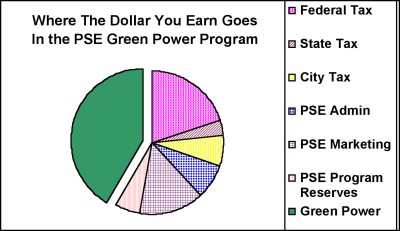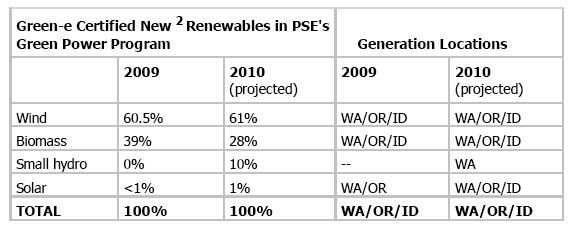Why Alternatives to the PSE Green Power Program Are PreferableBy Jim Lazar Many Olympia area residents choose to participate in the Puget Sound Energy (PSE) Green Power program to show their environmental commitment, and their willingness to pay a premium price for a premium product.
PSE obtains much of its so-called "green power" by purchasing renewable energy credits (RECs) from biomass combustion at the Grays Harbor Paper mill in Hoquiam. Biomass combustion is clearly a renewable resource, but it is not a carbon-free resource. The Gray's Harbor mill's CO2 emissions per kilowatt-hour are even higher than those from the Centralia coal plant. A large portion of the money associated with the green-power payment to PSE goes to pay taxes. First, you pay your electric bill with after-tax income, so the federal government takes 15% to 28% in income tax. Then there is a 4% state tax and a 9% City of Olympia tax (Lacey and Tumwater taxes are a little lower). For every dollar you earn that you commit to green power, only about 70% actually gets to PSE. Much of what gets to PSE is spent on marketing and administration. Only 55% of what gets to PSE actually goes to pay for green power. (PSE Green Power Report, Spring, 2010). Including all the taxes, that means that only about 41 cents of the dollar you earn actually goes to green power if you participate in the PSE program. The graphic on the left shows the flow of the dollar you earn. What Are Your Alternatives? First and foremost, invest in your own home energy efficiency. If, instead of giving extra money to PSE, you invest in reducing your electricity usage at home, you will save money, save energy, reduce emissions from electricity generation, reduce natural gas imports, and make your home more comfortable. Start with an audit available from Thurston Energy. You will reduce your after-tax expenditures for energy, making the benefits much greater. Investments in energy efficiency also support local jobs and businesses.
What PSE does with your money is to buy "Renewable Energy Certificates" from builders of renewable energy facilities – not the actual power produced. You can buy renewable energy certificates from a vendor other than PSE. There are many to choose from, and you can choose exactly the kind of power you want to support. Many of these offer wind and solar power, and charge less per kilowatt-hour than PSE. A list of green power vendors in Washington who are USEPA Green Power partners, including several that are registered charities, is available at: http://apps3.eere.energy.gov/greenpower/buying/buying_power.shtml?state=W Spend the money on rain gear, and ride your bike to work. Transportation energy use is the biggest part of the Washington State carbon footprint. Or walk instead of driving and purchase extra sustenance from your local bakery. Bottom line: The PSE Green Power program is an easy way to express your commitment to the environment, but it's not a very cost-effective way. You can get more "green" for your green by avoiding the PSE program and its high administrative costs. You also can choose to NOT support some of PSE's power choices, such as biomass combustion. It's your money. But, whatever you do, don't 'do nothing.' There is no planet B. Jim Lazar, is a Consulting Economist based in Olympia, Washington.
Back to Home page. |

 Unfortunately, as with some good causes, there are a few warts and barnacles that come with the PSE program.
Unfortunately, as with some good causes, there are a few warts and barnacles that come with the PSE program.
 You can donate to a charity that spends to support green power. If you donate to the Bonneville Environmental Foundation, NativeEnergy, Carbonfund, or other registered charities that support green power, you can normally get a tax deduction for your donation, eliminating the federal tax piece. Bonneville and some others allow you to select exactly what kind of green power you want to support – solar, wind, biogas – it's your choice, not PSE's. The donations do not flow through your electric bill, eliminating the state and city tax pieces. In addition, most charities spend a much smaller fraction of their revenue on administration and marketing. More like 80 cents of the dollar you earn actually goes to green power – twice as much as in PSE's program.
You can donate to a charity that spends to support green power. If you donate to the Bonneville Environmental Foundation, NativeEnergy, Carbonfund, or other registered charities that support green power, you can normally get a tax deduction for your donation, eliminating the federal tax piece. Bonneville and some others allow you to select exactly what kind of green power you want to support – solar, wind, biogas – it's your choice, not PSE's. The donations do not flow through your electric bill, eliminating the state and city tax pieces. In addition, most charities spend a much smaller fraction of their revenue on administration and marketing. More like 80 cents of the dollar you earn actually goes to green power – twice as much as in PSE's program.